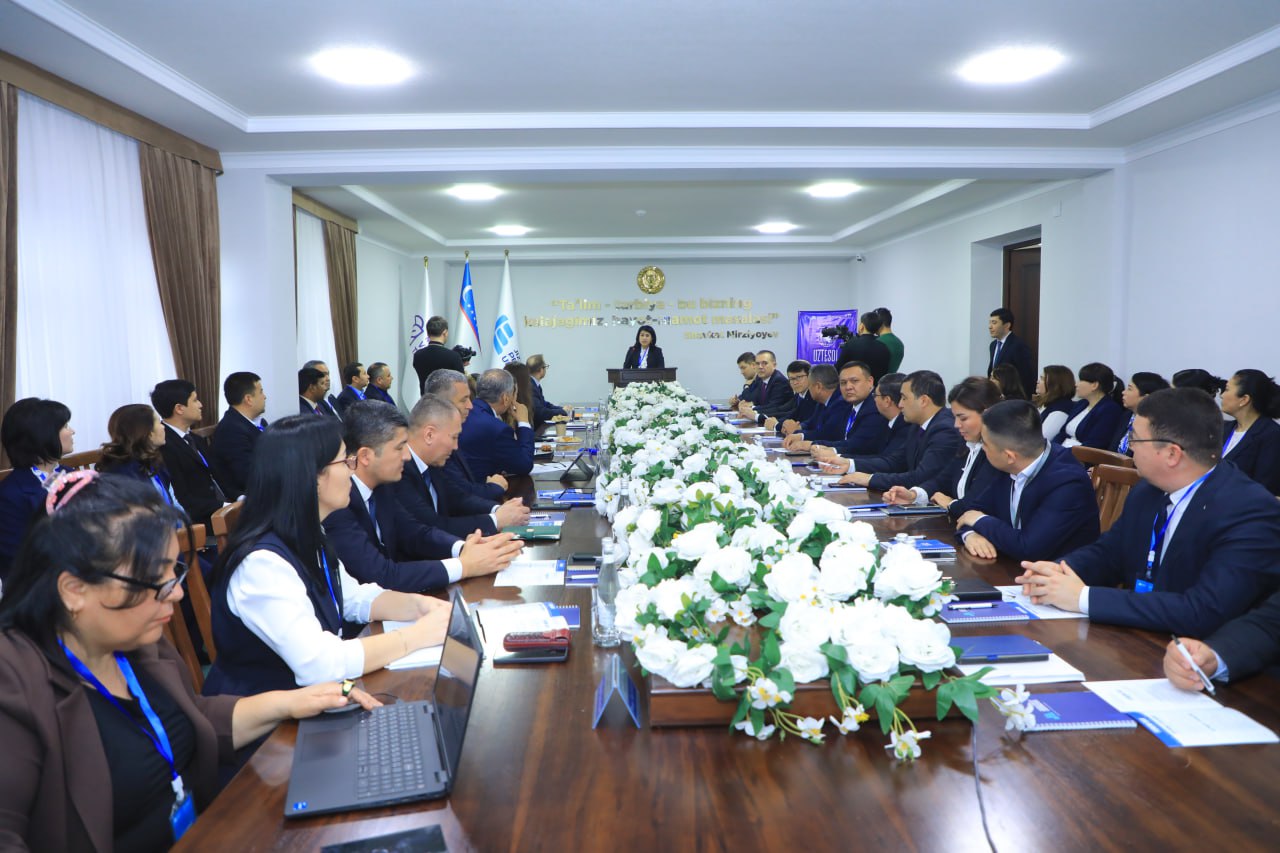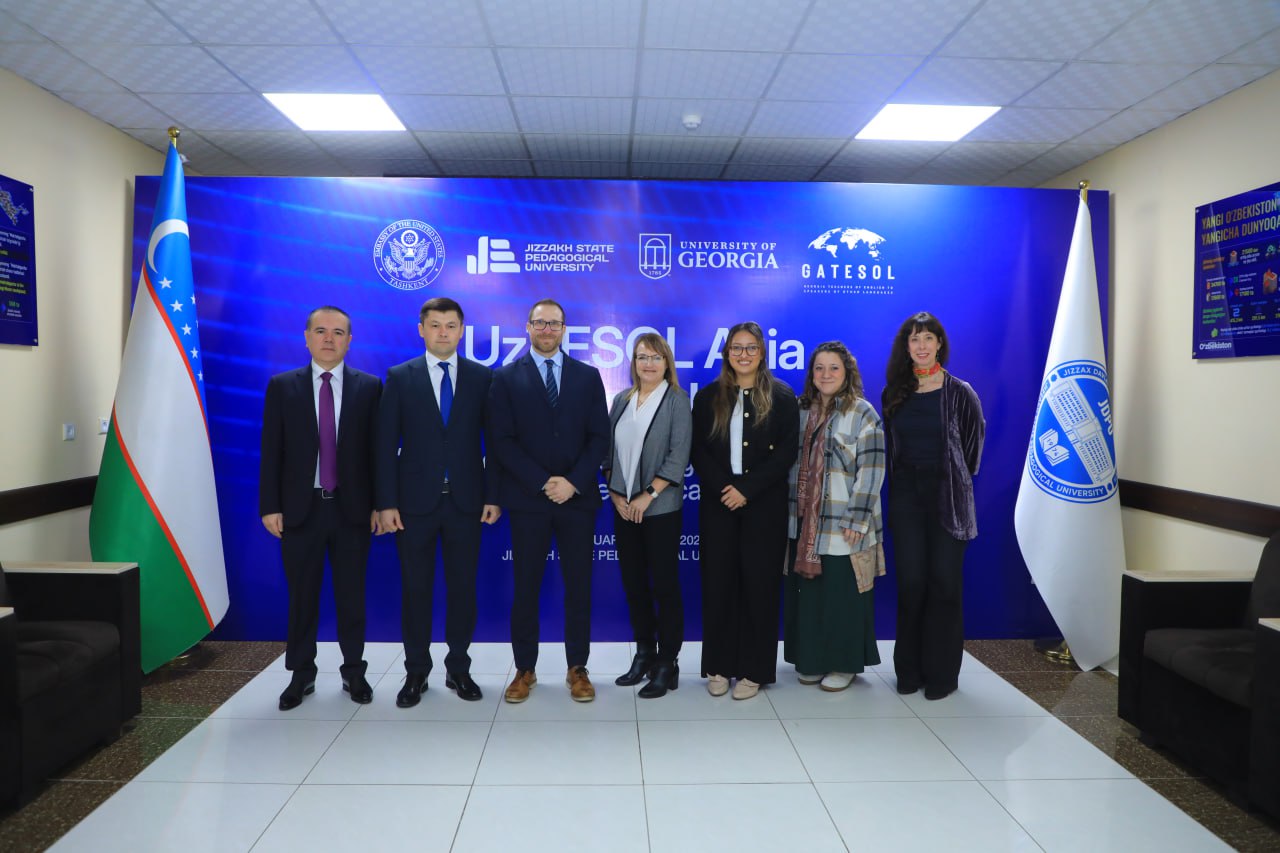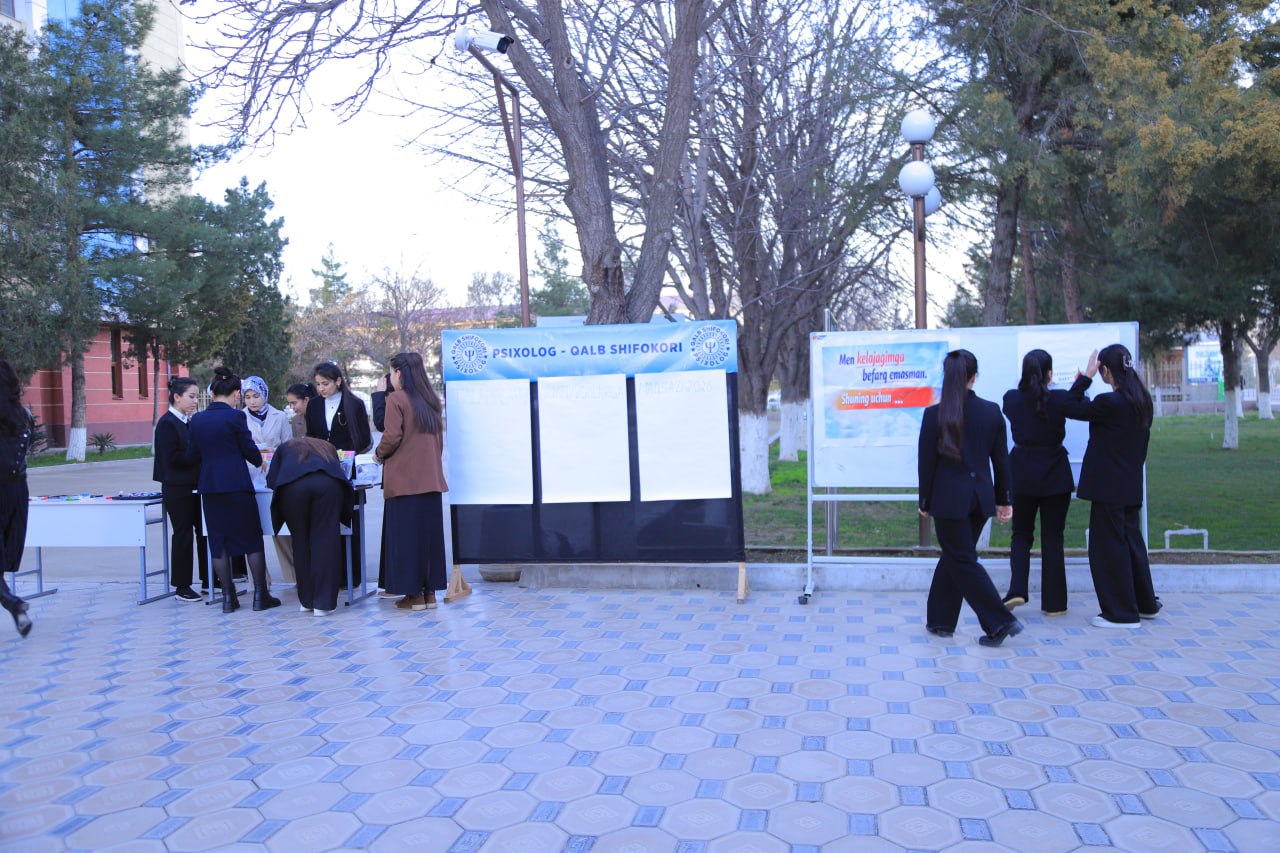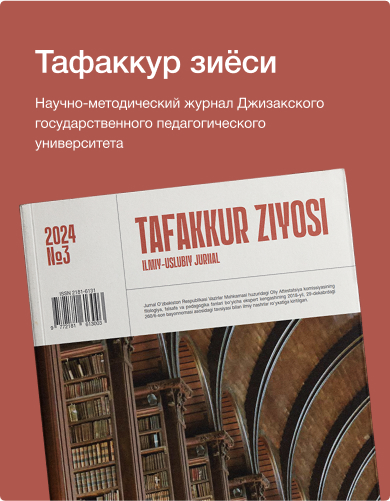SAYDAYEV OBID
Jizzakh State Pedagogical University
Sharof Rashidov 4, Jizzakh 130100, Uzbekistan
E-mail: obidsaydayev@gmail.com
ABSTRACT
The purpose of extracurricular activities is to create conditions for the manifestation and development of their interests by the child on the basis of free choice, comprehension of spiritual and moral values and cultural traditions. In the process of learning, students develop knowledge of the conservation of natural resources and the protection of nature. Love for the Motherland, its people, the protection of the nature of our land, the preservation and increase of its wealth are the properties of a person’s aesthetic feelings. The ability to perceive and understand ecological beauties is being formed, their knowledge of the natural changes taking place in our country is increasing.
Key words: learning technologies, extracurricular activities, learning tasks, graphics, nature conservation, knowledge about the conservation of natural resources and nature protection
Introduction
One of the main tasks set for primary education is the formation of a conscious attitude of students to the world around them. The successful solution of this problem requires teachers to have deep knowledge in their field, a high ecological culture, a creative approach, and training based on pedagogical technologies. Only the teacher who possesses these qualities should educate a comprehensively developed person who has deep theoretical knowledge in the field of environmental education, knows the secrets of natural processes, understands its social, practical and spiritual significance, and is consciously related to nature. Various tools, media, textbooks, and extracurricular activities are important resources for teacher teaching.
Education of students in the spirit of respect for nature is not part of the course. The lesson is limited in time, during which many important ecological knowledge cannot be transferred to students. Extracurricular activities are not limited in time. The development of environmental knowledge obtained by students during the lesson in extracurricular activities gives effective results. In educating younger students in the spirit of caring for nature, extracurricular activities are a continuation of the knowledge gained by students during the lesson and integrate their content into a single process.
In the process of learning, students develop knowledge of the conservation of natural resources and the protection of nature. Love for the Motherland, its people, the protection of the nature of our land, the preservation and increase of its wealth are the properties of a person’s aesthetic feelings. The ability to perceive and understand ecological beauties is being formed, their knowledge of the natural changes taking place in our country is increasing. A teacher engaged in any pedagogical activity, especially a teacher of primary education, needs to thoroughly understand the organic connection between nature and human life, to master the technique of getting students interested in this area.
Since the issue of conservation and respect for nature is one of the main tasks of education, it contributes to educating children in the desire to preserve and increase natural resources. The main goal of reforms in the field of education is to bring up a physically healthy and spiritually mature, perfect person. Primary education is the most important stage in mastering natural science knowledge in the field of environmental education of students in the system of primary education. Therefore, from this period begins the relationship of man to nature and the future. It is necessary to start teaching nature conservation to schoolchildren with the realization that each person is a source of nature. Then the students want to come to the conclusion that in order to protect nature, first of all, it is necessary to protect yourself and your loved ones, and to influence this.
One form of translation is circle. It covers a certain circle of participants and provides an opportunity to learn more about how to appreciate nature. Membership in the circle is voluntary, but the student undertakes to work according to a certain plan and bring the work begun to the end. The plan should include what the students can do. The main task of the teacher is to provide active work that gives practical results. Oral presentation must be coordinated with a demonstration of natural or visual weapons, social work of students aimed at developing practical skills and abilities, and other methods.
Preparation for training is of great importance in the successful operation of the circle. Before the first lesson, it is necessary to remind students of the time of its transfer, to think over all aspects of the content of the introductory conversation that introduces students to the tasks. When drawing up a work plan for the circle, it is necessary to discuss the intended topic with students and take into account their suggestions. At the first meeting of the circle, the council of its asset (chairman, his deputy, members of the editorial board) is elected and the name (“I respect nature”, “We and nature”, “Young naturalist”, “Nature lovers”) is approved. Announce a competition for the best name. Therefore, it is necessary to develop and approve the principles of behavior of participants. The following rules: active participation in the work; complete all tasks on time; finish each job; keeping a diary of observations and work performed; helping friends; It is necessary to adhere to regular participation in training.
The work of the group is led by the teacher. Attendance is recorded by the captain or his deputy in a special journal. Classes are held every two weeks on a specific day and time.
Main scientific results and their discussion
Extracurricular activities are an additional and free form of education that allows students to expand their creative activities. Educational trips are of great importance in the knowledge of the world around us. Travel lessons are an important means of educating students in the spirit of caring for nature as a form of organizing educational activities. In the process of observing nature, cognitive activity is formed, students’ ideas about the interaction of animate and inanimate nature, flora and fauna are expanding.
Communicating with nature makes students feel great. Students will be fascinated by the green grass, chirping birds, flying butterflies, colorful trees and plants.
The purpose of organizing trips is to study the way of life of trees, plants, insects, birds in the garden.
An important factor in the success of the trip is the following:
- the accuracy of the purpose of the trip;
- triple choice of object;
- organization of a trip according to a specific plan;
- precise development of educational tasks that serve to direct students’ attention to the observed object;
- ensuring the problematic nature of training tasks;
- encouraging students to free and independent action in the process of observation;
- achievement of individual activity of each student;
- the presence of conditions that allow consistent control of their activities.
During the trip, the knowledge gained by students during the year will be consolidated and the activity of phenological observations will increase. There are several ways to introduce students to environmental concepts during a trip: conversation, story, trip, question-answer, observation, conclusion.
Topic: What is nature? We are nature.
During the introductory interview, the teacher answers the following questions:
– What is the importance of the environment in human activities?
– Why do we honor nature and call her “Mother Nature”?
– How to keep long hair so as not to harm nature?
An understanding is given that it is impossible to break the branches of plants and trees, not to harm insects and birds.
During the trip, students write down what they see in their notebooks: trees and their species, plants, flowers, insects and birds.
Students are asked to complete assignments.
After completing the tasks, the teacher sums up the lesson-journey and gives homework to the students.
Homework: write an essay about your impressions of the trip.
On the basis of travel lessons, students should love the beauty of nature, get aesthetic pleasure from it, study the relationship between nature and society, as well as the consequences of human activity on nature.
During the trip, non-traditional activities, role-playing game, action game, observation methods are used. This lesson increases students’ interest in the world around them. They are brought up in the spirit of a conscious attitude towards nature.
The value of extracurricular activities in the subjects “The World”, “Natural Science” and its socially useful direction. Various activities with students outside of class: excursions, morning performances, extracurricular activities there will be guided tours, quizzes and other events. These teacher-led activities arouse students’ interest in nature. Extracurricular activities in natural science make it possible to expand, deepen and clarify the knowledge gained in the classroom, stimulate interest in the study of nature, develop students’ activity and attitude towards respect for nature, and organize free time. In the upbringing of younger schoolchildren in the spirit of caring for nature, extracurricular activities are of educational importance, as they affect the creative abilities of students. They form a material worldview and cocktail culture, develop curiosity and observational skills, foster a sense of community and a love of nature. Extracurricular activities in the natural sciences are considered as one of the means of comprehensive development of the student’s personality.
The content of class work. Extracurricular activities in the natural sciences include a variety of activities related to the study and appreciation of nature, growing plants and caring for animals. These exercises should not repeat lessons and should only be based on the knowledge gained in the lessons. We draw the attention of students to observations in nature, as well as in a living corner of the school and in the field of experience; It is necessary to organize socially useful work in the field of schooling, protection of birds, pest control. Practical work in nature should be carried out along with observations and reading appropriate books.
In order for extracurricular work to move quickly, it is necessary to carefully consider the forms of its organization. Extracurricular activities should be divided into three groups. Public events include film screenings, field trips, matinees, organizing student work, as well as holding events (harvest day, garden week, tree planting week, bird day, etc.).
Group learning includes the activities of young geographers and young naturalists. Individual training, production of wall newspapers, albums; a corner of wildlife and a school experimental site, work in nature; includes a selection of natural science materials for extracurricular reading and an information corner, an analysis of the magazines “Young Naturalist” about nature, popular science books for students.
All types of extracurricular activities should complement and improve each other while educating younger students in the spirit of caring for nature. There must be a certain interest in the performance of an individual task or the teacher’s recommendation. Having identified similar interests in several students, the teacher combines them into a group. Such associations should be the organizing center of non-mass events, and for their successful victory, various preparations and a large number of participants are necessary.
In order to educate students in the spirit of caring for nature, extracurricular work should be diverse in organizational form, content and methods of implementation. It depends on the composition of the students, their age, interests and preferences, the location of the school, the time of year, facilities and equipment. An approximate list of works that should be used by primary school teachers is as follows:
- observations in nature, identification of the causes of natural phenomena;
- registration of materials collected as a result of trips to the museum of geography (museum of nature), mining sites, fields and farms;
- collection and design of natural materials , collection, herbarium, layout, model making;
- drawing up a map of the surroundings of the school and a plan of the territory adjacent to it;
- to read in a team articles published in popular science, natural science journals, journals “Huncha” and “Yosh Nabatistunos”;
- organizing a corner of wildlife, observing plants and animals and conducting experiments on them, as well as conducting experiments and observations on the school site;
- watching films, filmstrips, slides of natural science content;
- get acquainted with exhibitions of achievements of the national economy;
- participation in public events (holidays, early matinees, etc.);
- Acquaintance with animals in the zoos of Tashkent and Termez, Surkhandarya region;
- protect nature, organize conversations about the benefits and significance of plants and animals in human life;
- socially useful work aimed at caring for nature, protecting gardens, replanting trees and shrubs and caring for them, collecting fruits of foreign and cultivated plants, combating weeds, pests of fields, lice and forests, protecting useful animals;
- natural science room, geography corner, exhibitions, equipment of the nature corner;
- making a simple exhibition model from natural material, organizing an exhibition of student works;
- material for wall newspapers and albums ;
- publication of wall newspapers “About mother nature”, “Respect nature”, “Uki about nature” and similar news;
- a news corner, as well as literature for additional study of these subjects outside of class .
In education in the spirit of respect for nature, the teacher plans in advance the methods and techniques of natural science work outside the classroom, involves students in various activities. The success of extracurricular work largely depends on the correct selection of material for each lesson, the structural plan and method of its presentation, as well as the active participation of students in the planned activities.
Individual work on the education of primary school swimmers in the spirit of respect for nature.
With students who have a knowledge of nature and an inclination, or at least an interest, natural science is conducted individually. An important role in the emergence of interest in nature among students is played by the personality of the teacher, his love for nature and an enthusiastic attitude towards it, the ability to follow and interest students. How he organizes observations in the classroom, how he substantiates the necessity and importance of this work, how he tries to develop the knowledge of nature, depends not only on the quality of students’ knowledge, but also on the forms of work with them. natural science work outside the classroom.
The fulfillment of individual tasks forms personal labor skills, fills students’ free time with useful and interesting activities. The content of individual tasks is determined by the interests of students. Whatever the student is interested in, whether it is caring for indoor plants, collecting stamps or postcards depicting animals and plants, creating a herbarium, conducting experiments and observations in nature, this should be approved and encouraged by the teacher. The topics of individual tasks are chosen in accordance with the interests of students, but the content of the top games, the organization and methodology for their implementation must be carefully thought out by the student (object of research, observation or the workplace is determined, a plan is drawn up). In order to get the job done and not be burdened by it, the teacher regularly assists students in completing individual assignments.
It is necessary to check the performance of individual tasks, and at the end of the work it is necessary to report the results to the students. It should always be remembered that the practical significance of individual work is ensured only when students understand the need for its implementation. Therefore, it is useful from time to time (in a science class or outside the classroom) to listen to a report on the work done. The results of each individual work will be the property of all students. Such reports stimulate interest in extracurricular activities, enrich and expand students’ knowledge of natural education, encourage them to actively participate in all forms of extracurricular activities.
At the first lesson, you should not be limited only to organizational issues. Students should be given small but interesting introductory exercises so that they can get an initial idea of what they will be interested in and what they will work on when they finish the work. The work begins with watching videos, reading popular science literature. Each young naturalist or a small group of 34 people chooses a specific topic for them with the help of a teacher. The task of the group leader is to introduce each participant to an interesting and useful topic that he can deal with. The work carried out in Tugarak should be diverse, but should be united by the common goal of caring for and studying nature. Values are the product of human consciousness and activity, as well as the socio-economic, cultural and spiritual development of society.
The task of extracurricular and extracurricular activities is not only to keep children busy, but also much more difficult, that is, to consolidate their knowledge gained in the classroom, arouse their interest in our national values, fill their lives with fun and excitement. The task of the class teacher is responsible and important in the organization of educational work, as well as during the lesson. This responsibility requires them to constantly work on themselves, creative work.
Conclusion
The main feature of extracurricular educational activities aimed at organizing the activities of students is the preparation of students for social life. In continuation of his daily work, the student directly participates in conversations and sessions of questions and answers of various contents outside the classroom, participates in organizing parties, plays roles, listens, etc., thereby enriching his knowledge and the spiritual world. In particular, they are organized today in order to increase the interest of schoolchildren in our national heritage. Any extracurricular activity should be preceded by various educational tasks. Each one requires unique characters, different shapes, tools, and creative work.
LITERATURE
- Grigoriev, V. Extracurricular activities of schoolchildren. M.: Marifat, 2010. – 223 p.
- Grigoriev, D.V. Extracurricular activities of schoolchildren: M.: Education, 2010. 14. Gromov S.V. Encyclopedia of elementary physics: book. Text for schoolchildren. /S.V. Thunder hunt. : Marifat, 2007. – 399 p .
- B. Extracurricular work: Education of schoolchildren, 2012. – No. 4. Pages 15-21
- Kazarenkov V.I. Psychological and pedagogical foundations for the organization of extracurricular activities of schoolchildren: Monograph. – M.: RUDN, 2011.
- Kupriyanov B.V. Additional education and extracurricular activities: problems of interaction and Education of schoolchildren, 2012. – No. 6. Pages 3-8.
- Kutiev V.O. Extracurricular activities of schoolchildren. : Marifat, 1983. – 223b.
- Lerner, I.Ya. Didactic foundations of teaching methods. : Pedagogy, 1981. – 186 p.





